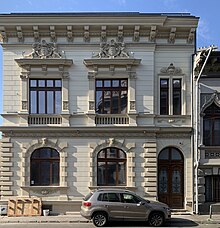ܒܝܬܐ
Appearance
Assyrian Neo-Aramaic
[edit]Etymology
[edit]
From Aramaic בַּיְתָּא (baytā), from Proto-Semitic *bayt-; compare Arabic بَيْت (bayt), Hebrew בַּיִת (báyit) and Akkadian 𒂍 (bītum).
Pronunciation
[edit]- ܒܲܝܬܵܐ:
- (Standard) IPA(key): [ˈbajtaː]
- (Ashiret) IPA(key): [ˈbeːθaː]
- (Bohtan) IPA(key): [ˈbaːtaː]
- (Hertevin) IPA(key): [ˈbeːtaː]
- (Jilu) IPA(key): [ˈbiːjaː]
- (Nineveh Plains) IPA(key): [ˈbeːθaː]
- (Sanandaj) IPA(key): [ˈbeːsaː]
- (Tkhuma) IPA(key): [ˈbeːθaː]
- (Urmia) IPA(key): [ˈbeːtaː]
- (Walto) IPA(key): [ˈbaːʃaː]
- ܒܝܵܬ݂ܵܐ:
Noun
[edit]ܒܲܝܬܵܐ • (baytā) m sg (plural ܒܵܬܹ̈ܐ (bāttē) or ܒܵܬ̈ܘܵܬ݂ܵܐ (bātwāṯā) or ܒܲܝ̈ܬܲܘܵܬ݂ܵܐ (baytawwāṯā) or ܒܲܝܬ̈ܘܵܬ݂ܵܐ (baytwāṯā) or ܒܵܬܵܢܹ̈ܐ (bātānē) or ܒܲܝ̈ܬܵܢܹܐ (baytānē))
- house, home
- household
- (in the construct state, in compounds) room, chamber, cell, place, location, area
- (astronomy) house, mansion, station
- (in compounds) companions, followers, servants; sect
- (in compounds with a gentilic name) land, country; people, nation, race, tribe, class
- (in the construct state) family
Inflection
[edit]| isolated forms | with possessive pronouns | |||||||
|---|---|---|---|---|---|---|---|---|
| state | form | person | singular | plural | ||||
| m | f | |||||||
| singular | absolute | – | 1st person | ܒܲܝܬܝܼ (baytī) | ܒܲܝܬܲܢ (baytan) | |||
| construct | ܒܹܝܬ݂ (bēṯ) | 2nd person | ܒܲܝܬܘܼܟ݂ (baytūḵ) | ܒܲܝܬܵܟ݂ܝ (baytāḵ) | ܒܲܝܬܵܘܟ݂ܘܿܢ (baytāwḵōn) | |||
| emphatic | ܒܲܝܬܵܐ (baytā) | 3rd person | ܒܲܝܬܹܗ (baytēh) | ܒܲܝܬܵܗ̇ (baytāh) | ܒܲܝܬܗܘܿܢ (baythōn) | |||
| plural | absolute | – | 1st person | ܒܵܬܝܼ̈ (bāttī) | ܒܵܬܲܢ̈ (bāttān) | |||
| construct | ܒܵܬܲܝ̈ (bāttay) | 2nd person | ܒܵܬܘܼ̈ܟ݂ (bāttōḵ) | ܒܵܬܵܟ݂ܝ̈ (bāttāḵ) | ܒܵܬܵܘ̈ܟ݂ܘܿܢ (bāttāwḵōn) | |||
| emphatic | ܒܵܬܹ̈ܐ (bāttē) | 3rd person | ܒܵܬܘܼ̈ܗܝ (bāttūh) | ܒܵܬ̈ܘܿܗ̇ (bāttōh) | ܒܵܬܗ̈ܘܿܢ (bātthōn) | |||
Derived terms
[edit]- ܒܲܝܬܵܝܵܐ (baytāyā, “domestic, familiar, related”)
- ܒܲܝܬܘܼܬ݂ܵܐ (baytūṯā, “household, family”)
- ܒܲܝܬܘܿܢܵܐ (baytōnā, “cottage, cabin”)
- ܒܲܪ ܒܲܝܬܵܐ (bar baytā, “bond slave born in the house”)
- ܪܲܒ݂ ܒܲܝܬܵܐ (raḇ baytā, “paterfamilias, househusband, homemaker”)
- (construct state) see → ܒܹܝܬ݂ (bēṯ)
Verb
[edit]ܒܝܵܬ݂ܵܐ • (byāṯā)
- present participle of ܒܵܐܹܬ݂ (bāˀēṯ)
Classical Syriac
[edit]Etymology
[edit]From Proto-Semitic *bayt-.
Pronunciation
[edit]- (Classical Edessan) IPA(key): [ˈbaj.tɑ]
- (Eastern Syriac) IPA(key): [ˈbaj.tɑ]
- (Western Syriac) IPA(key): [ˈbɑj.to]
Noun
[edit]ܒܝܬܐ • (baytā) m (plural ܒܬܐ (bāttē))
- house, home
- temple, church
- room, chamber, cell
- stable
- hive
- vessel, receptacle, urn, case
- verse, stanza, introit, strophe, hymn
- (medicine) seat, base (of a humor/humour)
- (astronomy) house, mansion, station
- (in compounds) companions, followers, servants; sect
- (in compounds with a gentilic name) land, country; people, nation, race, tribe, class
- (in compounds marking familial descendance) family
Inflection
[edit]Irregular singular absolute form in ܒܝ (bay) as well as an irregular plural form.
| isolated forms | with possessive pronouns | |||||||
|---|---|---|---|---|---|---|---|---|
| state | form | person | singular | plural | ||||
| m | f | m | f | |||||
| singular | absolute | ܒܝ | 1st person | ܒܝܬܝ | ܒܝܬܢ | |||
| construct | ܒܝܬ | 2nd person | ܒܝܬܟ | ܒܝܬܟܝ | ܒܝܬܟܘܢ | ܒܝܬܟܝܢ | ||
| emphatic | ܒܝܬܐ | 3rd person | ܒܝܬܗ | ܒܝܬܗ | ܒܝܬܗܘܢ | ܒܝܬܗܝܢ | ||
| plural | absolute | ܒܬܝܢ | 1st person | ܒܬܝ | ܒܬܝܢ | |||
| construct | ܒܬܝ | 2nd person | ܒܬܝܟ | ܒܬܝܟܝ | ܒܬܝܟܘܢ | ܒܬܝܟܝܢ | ||
| emphatic | ܒܬܐ | 3rd person | ܒܬܘܗܝ | ܒܬܝܗ | ܒܬܝܗܘܢ | ܒܬܝܗܝܢ | ||
References
[edit]- “by”, in The Comprehensive Aramaic Lexicon Project, Cincinnati: Hebrew Union College, 1986–, retrieved 2011-08-26
- Costaz, Louis (2002) Dictionnaire syriaque-français ∙ Syriac–English Dictionary ∙ قاموس سرياني-عربي, 3rd edition, Beirut: Dar El-Machreq, pages 29a–b
- Payne Smith, Jessie (1903) A Compendious Syriac Dictionary Founded Upon the Thesaurus Syriacus of R. Payne Smith, D.D., Oxford: Clarendon Press, pages 43a–b
- Sokoloff, Michael (2009) A Syriac Lexicon: A Translation from the Latin, Correction, Expansion, and Update of C. Brockelmann's Lexicon Syriacum, Winona Lake, Indiana, Piscataway, New Jersey: Eisenbrauns; Gorgias Press, pages 144b–145a
Categories:
- Assyrian Neo-Aramaic terms belonging to the root ܒ ܘ ܬ
- Assyrian Neo-Aramaic terms inherited from Aramaic
- Assyrian Neo-Aramaic terms derived from Aramaic
- Assyrian Neo-Aramaic terms inherited from Proto-Semitic
- Assyrian Neo-Aramaic terms derived from Proto-Semitic
- Assyrian Neo-Aramaic terms with IPA pronunciation
- Assyrian Neo-Aramaic lemmas
- Assyrian Neo-Aramaic nouns
- Assyrian Neo-Aramaic masculine nouns
- aii:Astronomy
- Assyrian Neo-Aramaic non-lemma forms
- Assyrian Neo-Aramaic verb forms
- Assyrian Neo-Aramaic present participles
- aii:Buildings
- aii:Housing
- aii:Family
- Classical Syriac terms inherited from Proto-Semitic
- Classical Syriac terms derived from Proto-Semitic
- Classical Syriac terms with IPA pronunciation
- Classical Syriac lemmas
- Classical Syriac nouns
- Classical Syriac masculine nouns
- syc:Medicine
- syc:Astronomy
- syc:Bodily fluids
- syc:Buildings
- syc:Containers
- syc:Family
- syc:Places of worship
- Classical Syriac nouns with irregular gender
- Classical Syriac nouns with irregular inflections
- Classical Syriac nouns with irregular plurals
